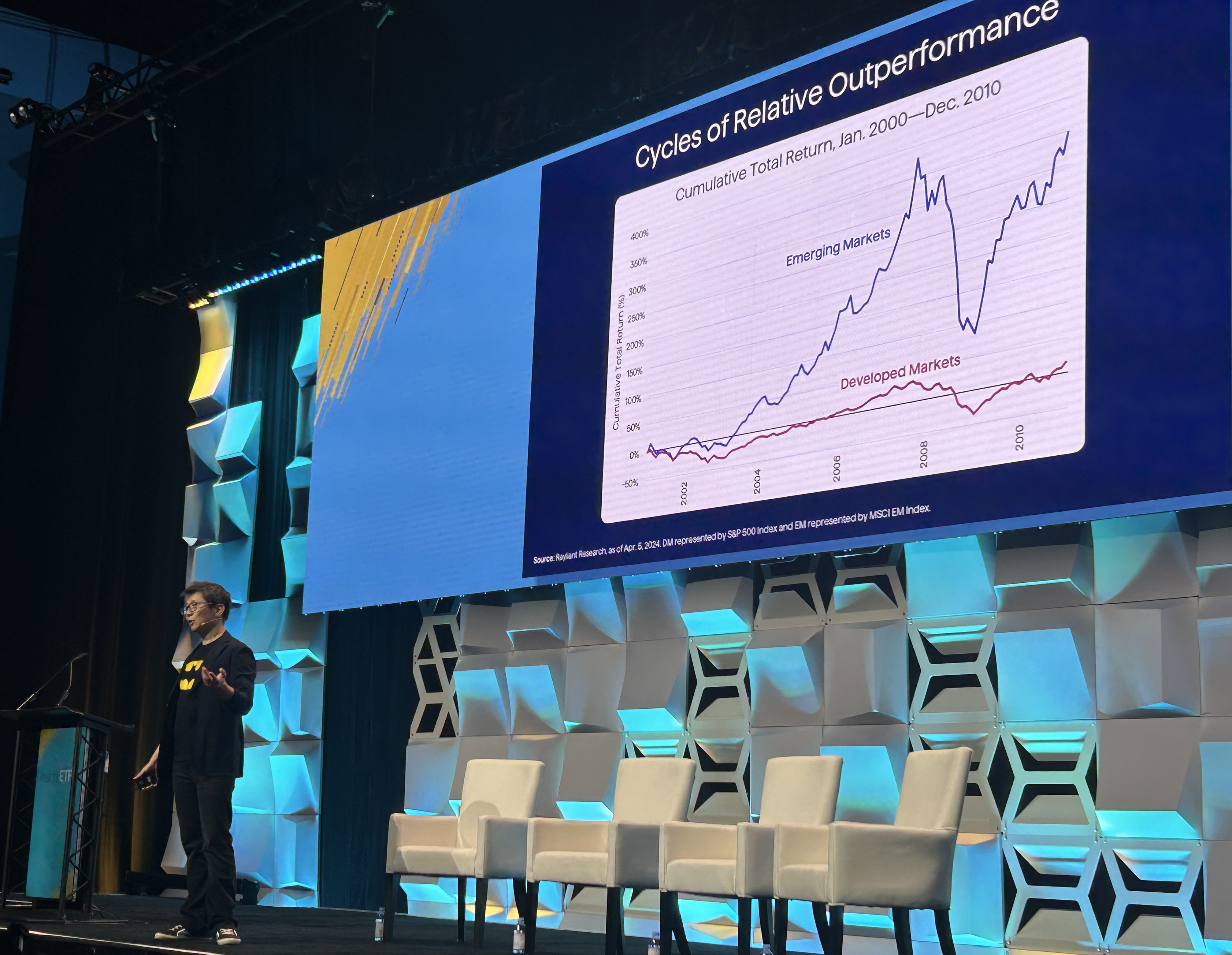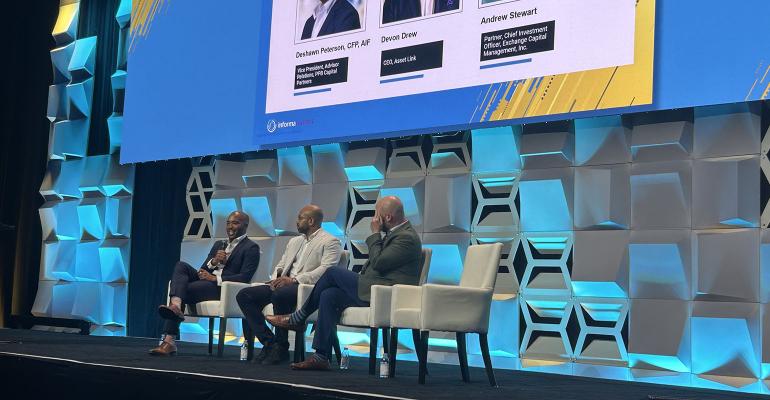The Tokenization Revolution Is Coming
Dan Weiskopf, of Tidal Financial Group, is also among those who expect a tokenization revolution in the investment space.
“One of the reasons we launched Block is that we thought that eventually tokenization was going to occur and replace ETFs,” he said.
The industry isn’t there yet, Weiskopf conceded. But he believes “it is going to happen.”
More Runway for Model Portfolios
John Davi, founder, CEO and CIO with Astoria Portfolio Advisors, sees more runway for adoption of model portfolios.
“If institutions can’t beat the market, if hedge funds can’t beat the markets, RIAs and advisors aren’t going to be able to beat the market,” he said.
Darren Hinshaw, director of research with NBC Securities, reiterated the point made at an earlier panel that tokenization is playing an increasingly important role in allowing more investors to access alternatives. People are taking private equity funds, breaking them into pieces and selling them as tokens. “The blockchain capabilities are going to be increasingly important," Hinshaw said.
Markets Haven’t Priced In Escalation of Global Conflicts
The global stage faces a more chaotic moment than at any point in the last 40 years, according to Robert G. Walsh, a retired U.S. Army Lieutenant General and advisory board member with Academy Asset Management.
Walsh cited the Israel/Hamas conflict and Russia’s invasion of Ukraine, a war on the European continent he said would have been unthinkable at the close of the Cold War. But according to Academy Chief Investment Officer Seth Rosenthal, the markets haven’t priced in the escalations just yet.
“So, you look at the volatility markets, whether they’re equity, credit rates, we’re either at or near lows,” he said. “(By) holding a higher percentage of risk-controlled assets, and having risk management framework in place, and to be prepared for that volatility, we think it will be an opportunity for clients that are prepared.”
According to Walsh, several things make the current moment unique. Though Israel had gone into the Gaza Strip militarily in the past, it was never for this duration. When it comes to Russia’s invasion of Ukraine, Walsh said the Baltic states feel a different, more potent sense of fear than the rest of the world.
China is militarily threatening places like Taiwan and the South China Sea, but Walsh also believed the country’s diplomatic and economic initiatives (such as the Belt and Road Initiative) are bearing fruit, particularly in parts of Africa. Walsh also worried about China and Russia’s “no-limits” partnership, which aims to limit U.S. impact around the globe.
“We’re in this Cold War, and it’s like when we were with Russia, the Soviet Union. That was all on the military and diplomatic side. Much of it today with China is on the economic side,” he said. Russia has a lot of military influence, but we need to continue to work to bring countries into our sphere of influence and not let them go into their sphere of influence.”
Walsh also cited the Houthi pirating of freight ships in the Red Sea, which forced more ships to take longer trips around South Africa. According to Rosenthal, shipping costs spiked 30% this year because of the attacks, but it hasn’t yet translated into inflation measures.
“On the energy side, we’ve been governing a little under $80 a barrel,” he said. “A spike could be problematic for inflation and consumer confidence.”
New Wrappers
“There are a lot of exciting things happening in the wrapper space today,” said Ronit Walny, head of fixed income client portfolio management with Northern Trust Asset Management. “If speed is important, tokenization, which is a fairly new wrapper, is coming into the play.”
What's Good for Some Isn't Good for Everyone
Andrew Stewart, CIO of Exchange Capital Management, said he likes to use the full spectrum of fund wrappers even for bigger clients with more wealth because their portfolios can benefit from increased liquidity if stock and bond markets go down. On the other hand, he said he would not recommend semi-liquid funds for clients who just barely qualify for them because if the market goes down, they will be in trouble.
Devon Drew, CEO of Asset Link, added: “Over the past six months, hedge funds have really struggled to fund raise. And now where are they going? They are going into the ETF space.”
A Shift In Bargaining Power Tilting Toward Emerging Markets

Rayliant CEO Jason Hsu
Jason Hsu, CEO of Rayliant, predicted that as more Americans retire, the bargaining power of producers in emerging markets is going to increase.
Right now, China exports $3.3 trillion in products to the world. But Chinese exporters get to keep only $60 billion of that, while $600 billion goes to platforms like Amazon and Walmart. Over the next decade, that power balance will change, Hsu said.
“The reason we are having sticky inflation is driven by the fact that every day there are 11,000 baby boomers retiring. We are losing a lot of productivity. We’re transforming into wealth consumers. And the reason we get to have work/life balance is because Asia is deeply convinced that life is only work.”
Tuesday, May 14, 2024
What Investors Are Getting Wrong About Impact and ESG Investing
Luke Oliver, managing director of climate investments and head of strategy with KraneShares, said advisors should focus on investing in companies that create positive impacts in the environment through their products and services while also delivering alpha returns rather than companies that get high ESG ratings.
“ESG [versus focusing on impact investing] was lacking a ‘Why?’” he said. “Why did you cut these company names [from your offerings]? ‘Oh, because they were getting bad ESG ratings. Nobody wants that. The real opportunities are where there are financial opportunities that drive capital.”
As an example, Linda Assante, partner with Uplifting Capital, mentioned affordable housing, since there’s immense need for it in the U.S., government incentives to invest it and a great supply/demand imbalance that drastically cuts down risk.
Keep Your Promises on AI
Myles Blechner, managing director at ACA Group said he’s seen two regulatory actions against advisors around AI so far.
They were not based on advisor’s use of AI, but on misleading advertisement promoting their use of AI in investment strategies. If you are promising you are using the most sophisticated AI to pick stocks, you better be able to back that up, he said.
Dual Share Mutual Fund/ETFs Are Coming
Aisha Hunt, principal of Kelley, Hunt & Charles, reiterated her belief that in the next year or two the SEC will grant relief for asset managers to offer dual-share mutual funds/ETFs.
There really isn’t a reason multi-billion dollar managers wouldn’t want to use such hybrid funds. People tend to think getting relief granted takes a long time, but in this case, it might be coming by the end of next year, Hunt said.
RIA should be getting ready for a new world of hybrid funds, with new disclosures, she said.
Expect Inflation Suprises
Jim Masturzo, CIO, multi-asset strategies at Research Affliates said to expect inflation surprises during his visionary address on "Immovable Forces: Inflation, Growth and Valuations"
“One of our thesis is inflation volatility," he said. "We talk about multi-peak inflation. Inflation is going up and down more rapidly than it has over the past decade.”
Jim Masturzo, CIO, multi-asset strategies at Research Affliates
College Athletes and Online Brokerages?
Ryan McCormack, senior factor and core equity strategist with Invesco, talked with Shannon Rosic, director of WealthStack content and solutions, and Jay Williams, co-founder and chairman of Improbably Media and former NBA star, about the reaction he gets when he presents his financial literacy course to college athletes.
“It’s shocking how many hands go up during the Q&A. And it’s througtful questions," he said. "The questions kids ask are: Who should I trust? How do I say no to a family member? Which online brokerage should I use?”







